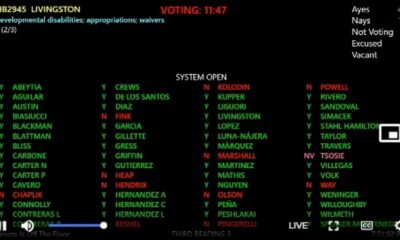Fashion
2024: A Step Forward in Housing Legislation, But Challenges Remain Ahead

Efforts to tackle Arizona’s housing crisis in 2024 showed promise but ultimately fell short, despite bipartisan interest.
Governor Katie Hobbs, alongside lawmakers from both parties, aimed to address soaring housing costs and a lack of available housing. Although Hobbs enacted several bills, others were vetoed or did not progress through the Legislature.
Most enacted legislation focused on accessory dwelling units, multifamily housing, and modifications to city zoning ordinances.
In August, Hobbs highlighted her administration’s commitment to affordable housing during a bill signing ceremony, presenting four significant housing bills.
“It’s not just the dream of homeownership that’s out of reach for so many today, it’s even the goal of stable, affordable rental housing,” Hobbs observed.
These bills mandated that certain municipalities permit the construction of accessory dwelling units, duplexes, triplexes, and townhomes on single-family lots. Additionally, they aimed to revise zoning laws to facilitate multifamily housing and expedite construction approvals.
While these initiatives received bipartisan backing, Hobbs vetoed the Starter Homes Act, sparking backlash from lawmakers across the aisle.
House Bill 2570, known as the Starter Homes Act, sought to limit municipal controls on lot sizes for single-family homes in communities with populations over 70,000. The bill aimed to prevent local homeowners’ associations from regulating home designs.
Sponsored by House Majority Leader Leo Biasiucci, R-Lake Havasu City, and supported by a diverse group of lawmakers, the Starter Homes Act advanced through both legislative chambers with bipartisan support.
In her veto letter dated March 18, Hobbs revealed that more than 90% of constituents who contacted her opposed the legislation, raising concerns about infrastructure, water supply, and potential legal ramifications.
“This is unprecedented legislation that would put Arizonans at the center of a housing reform experiment with unclear outcomes,” she stated, emphasizing the need for careful consideration in statewide reform.
Hobbs urged legislators to collaborate with organizations such as the League of Arizona Cities and Towns to formulate effective solutions that would not override local zoning laws.
Criticism of the veto came from both sides of the political spectrum. Democratic Sen. Anna Hernandez and Rep. Analise Ortiz expressed disappointment, suggesting that Hobbs had yielded to lobbyists.
“I hope the Governor takes this moment to reaffirm her commitment to solving the housing crisis rather than stand as another obstacle in the way of solutions,” Hernandez remarked following the veto.
Several other housing initiatives, proposed by both parties, failed to advance in 2024. These included plans to aid veterans facing homelessness and allow schools to lease properties for affordable housing initiatives.
Lawmakers expressed intentions to revisit the Starter Homes Act and similar bills in the next legislative session. However, as of now, no housing-related proposals have been pre-filed in anticipation of the January session.
Although significant strides were made in 2024 to address the housing crisis, both Hobbs and legislators acknowledged that additional efforts will be necessary in 2025 to guarantee Arizonans have adequate housing options.


















